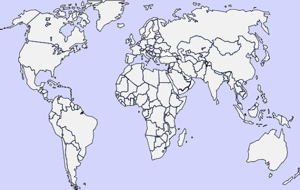 Sodium Sodium |
| Sodium is found in many different minerals, of which the most common is ordinary salt (sodium chloride, NaCl), which occurs
in vast quantities dissolved in seawater.
|
 Chlorine Chlorine |
| In nature, chlorine is found primarily as the chloride ion, a component of the salt that is deposited in the earth or dissolved
in the oceans - about 1.9% of the mass of seawater is chloride ions. Even higher concentrations of chloride are found in the
Dead Sea and in underground brine deposits.
|
 Potassium Potassium |
| The oceans are a source of potassium, but the quantity present in a given volume of seawater is relatively low compared with
sodium. It is also found abundantly in the Dead Sea.
|
 Manganese Manganese |
| Vast quantities of manganese exist in manganese nodules on the ocean floor. Attempts to find economically viable methods of
harvesting manganese nodules were abandoned in the 1970s.
|
 Iodine Iodine |
| Iodine naturally occurs in the environment chiefly as a dissolved iodide in seawater, although it is also found in some minerals
and soils.
|
 Gold Gold |
| The world's oceans hold a vast amount of gold, but in very low concentrations (perhaps 1-2 parts per 10 billion). A number
of people have claimed to be able to economically recover gold from sea water, but so far they have all been either mistaken
or crooks. Reverend Prescott Jernegan ran a gold-from-seawater swindle in America in the 1890s. A British fraud ran the same
scam in England in the early 1900s.
|


 Sodium
Sodium Chlorine
Chlorine Potassium
Potassium Manganese
Manganese Iodine
Iodine Gold
Gold